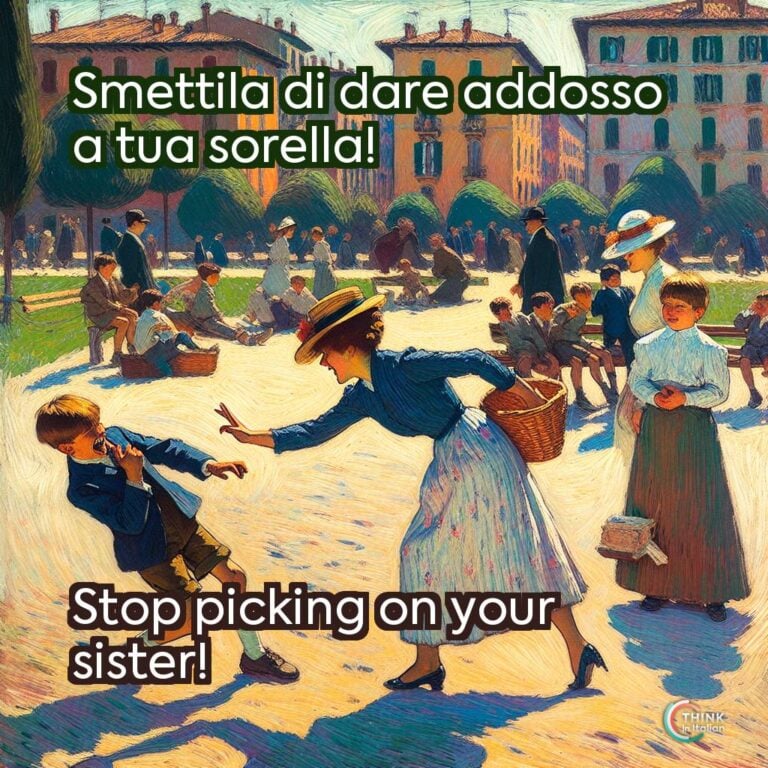What are Phrasal Verbs?
In linguistics, phrasal verbs are verbs that consist of a main verb combined with one or more particles to create a meaning that is different from the meanings of the individual parts.
Depending on the language, these particles can be prepositions, pronouns, or adverbs.
These particles are essential to the meaning of the phrasal verb and cannot be separated. For example, “give up” means “to quit” which is different from the meanings of “give” and “up” separately.
Since phrasal verbs are full-fledged verbs, they can be classified in two types:
- Transitive phrasal verbs: which require a direct object, like “pick up” as in “pick up the phone”.
- Intransitive phrasal verbs: which either do not require a direct object at all, or make use of a preposition to be linked to the indirect object, like “wake up” as in “I wake up at 7 AM”.
Italian Phrasal Verbs
Characteristics
When I teach Italian phrasal verbs to my students they initially panic, because of the randomness of their structures. But let me tell you something relieving: Italian phrasal verbs are not as common as in English.
Italian phrasal verbs are typically made up of a verb combined with a prepositional phrase or adverb. For example, andare via (to go away), composed of the verb andare (to go) and the adverb via (away).
Do you want to know something cool? Italian reflexive verbs can be considered phrasal verbs! For instance arrabbiarsi (to get angry) makes use of a grammatical construction, but it necessarily requires the reflexive pronoun to make sense.
An important aspect of Italian phrasal verbs is that they are not always inseparable. Being separable means that you can place an object between the verb and the preposition/adverb.
In Italian, this can happen with transitive verbs only. Let me show you what this means with an English example first: have a look at “turn off”. We can say both “turn the light off” and “turn off the light”.
In Italian, transitive phrasal verbs like prendere in giro (to make fun of) can do that too, although the standard order is preferred.
However, intransitive phrasal verbs are a semantic unit, meaning they must be used this way in order for its meaning to be fulfilled.
For instance:
Hanno preso in giro la mia amica.
They made fun of my friend.
Hanno preso la mia amica in giro.
They made fun of my friend.
Here, both are grammatically acceptable, but the first sentence sounds better than the second.
When it comes to intransitive verbs, instead, you cannot break them up and place an object (or any other element) in between, otherwise you will make the sentence ungrammatical or you will change its meaning.
Voglio andare via domani.
I want to go away tomorrow.
It would be incorrect if you said *Voglio andare domani via.
Of course, since these are verbs and they can be both transitive and intransitive, you might need to use a direct pronoun or an indirect pronoun to substitute for a noun.
For example, with the transitive phrasal verb prendere in giro (to make fun of), you can use a direct pronoun:
Li ho presi in giro.
I made fun of them.
where li replaces “them”, a masculine plural noun. Conversely, with an intransitive phrasal verb like andare incontro a (to meet or encounter), you can use an indirect pronoun:
Le sono andato incontro.
I went to meet her.
where le substitutes for a lei (to her).
Phrasal Verbs in Italian
Here I will show you a table of some common Italian phrasal verbs with their meanings in English:
| Italian Phrasal Verb | Literal Translation | Meaning in English |
|---|---|---|
| Andare via | Go away | To leave, to go away |
| Buttare giù | Throw down | To make someone sad / get someone down |
| Dare addosso a | Give on to | To criticize, to pick on |
| Entrare in | Enter in | To get into (a topic, a place) |
| Essere fuori (di testa) | Be outside (of mind) | To be crazy |
| Fare fuori | Do out | To kill, to get rid of, to finish off |
| Farsi avanti | Make oneself forward | To step forward, to volunteer |
| Mettere dentro | Put inside | To arrest, to jail |
| Mettere sotto | Put under | To run over, to hit |
| Mettere su | Put on | To set up, to establish (e.g., a business) |
| Passare sopra | Pass over | To overlook, to forgive |
| Portare avanti | Carry forward | To carry on (with), to develop |
| Portare via | Carry away | To take away |
| Prendere in giro | Take around | To mock, to make fun of |
| Rimanere fuori | Remain out | To stay out |
| Stare attento a | Stay attentive to | To be careful about |
| Tirare su | Pull up | To raise, to build, to cheer up |
| Tornare indietro | Return back | To go back, to turn back |
| Venire fuori | Come out | To come out, to emerge |
| Venire giù | Come down | To fall down, to collapse |
Examples
Let me now give you some sentences for each of the above phrasal verbs:
Dobbiamo andare via prima che inizi a piovere.
We need to leave before it starts raining.
Quella notizia l’ha davvero buttata giù.
That news really got her down.
Tutti gli danno addosso per ogni errore che commette.
Everyone picks on him for every mistake he makes.
È difficile entrare nella polizia.
It’s hard to get into the police force.
Devi essere fuori (di testa) per fare una cosa del genere!
You must be crazy to do something like that!
Hanno deciso di fare fuori il vecchio capo.
They decided to get rid of the old boss.
Nessuno si è fatto avanti per aiutare il povero uomo.
No one stepped forward to help the poor man.
Il ladro è stato messo dentro per dieci anni.
The thief was jailed for ten years.
Stava guidando troppo veloce e ha messo sotto un cane.
He was driving too fast and ran over a dog.
Hanno messo su un piccolo ristorante in centro.
They set up a small restaurant in the city center.
Dovresti passare sopra a quel commento offensivo.
You should overlook that offensive comment.
Continueremo a portare avanti questo progetto nonostante le difficoltà.
We will continue to carry on with this project despite the difficulties.
La polizia ha portato via il sospettato per ulteriori interrogatori.
The police took away the suspect for further questioning.
Mi hanno preso in giro per il mio nuovo taglio di capelli.
They made fun of me for my new haircut
I bambini sono rimasti fuori fino a tardi a giocare.
The kids stayed out late playing
Devi stare attento a non rompere quel vaso
You have to be careful not to break that vase.
Questa conversazione mi ha tirato su, grazie!
This conversation cheered me up, thank you!
Non posso tornare indietro dopo aver preso questa decisione.
I can’t go back after making this decision.
Alla fine, la verità è venuta fuori.
In the end, the truth came out.
Durante la tempesta, un albero è venuto giù vicino alla casa.
During the storm, a tree fell down near the house.




